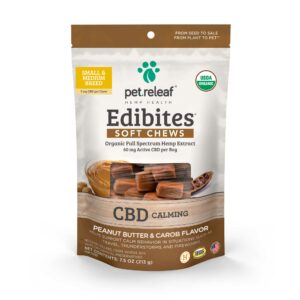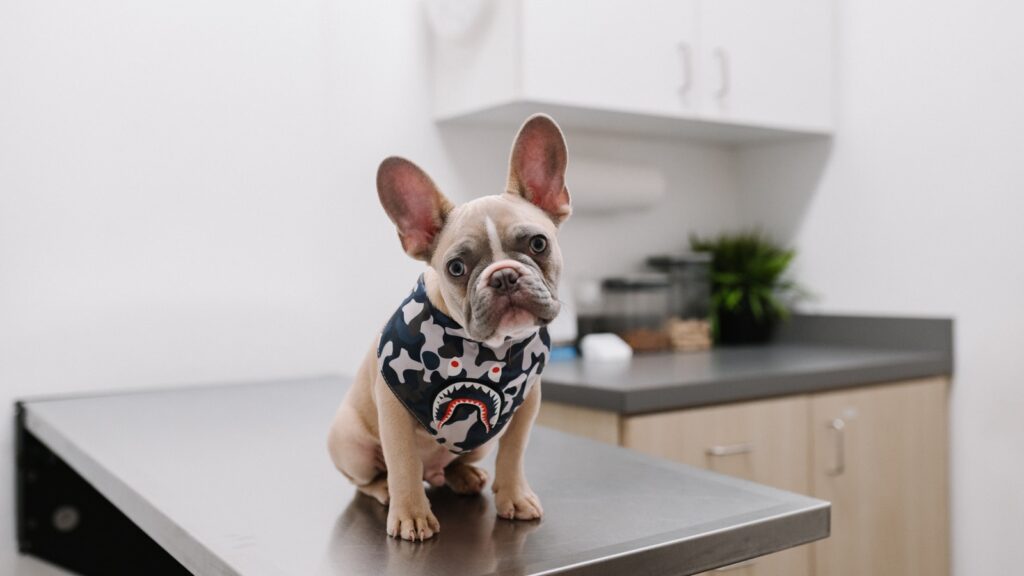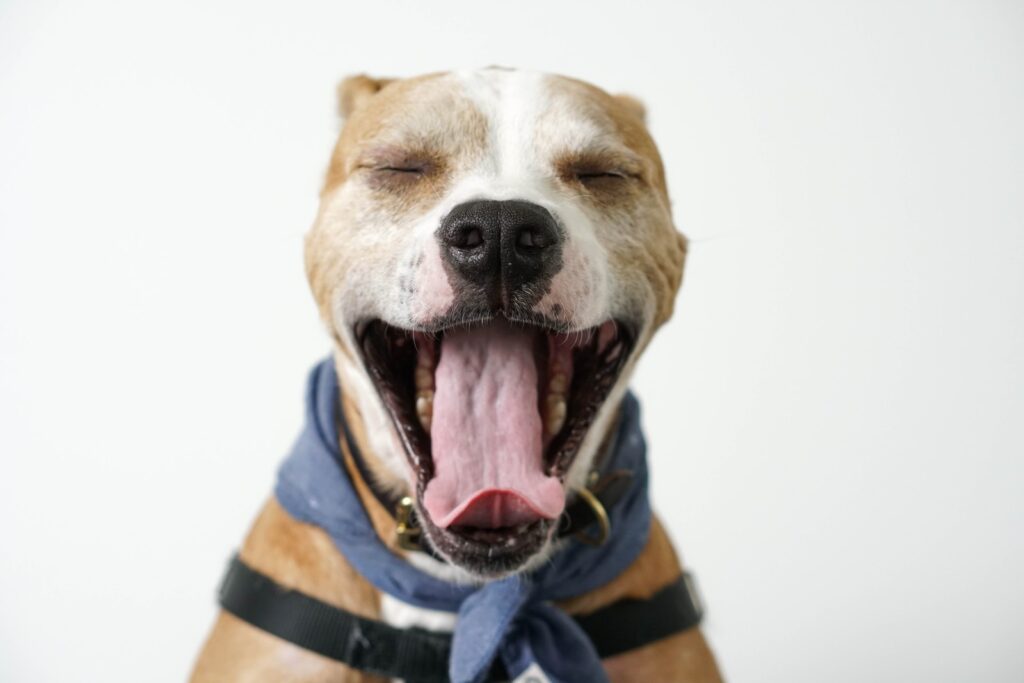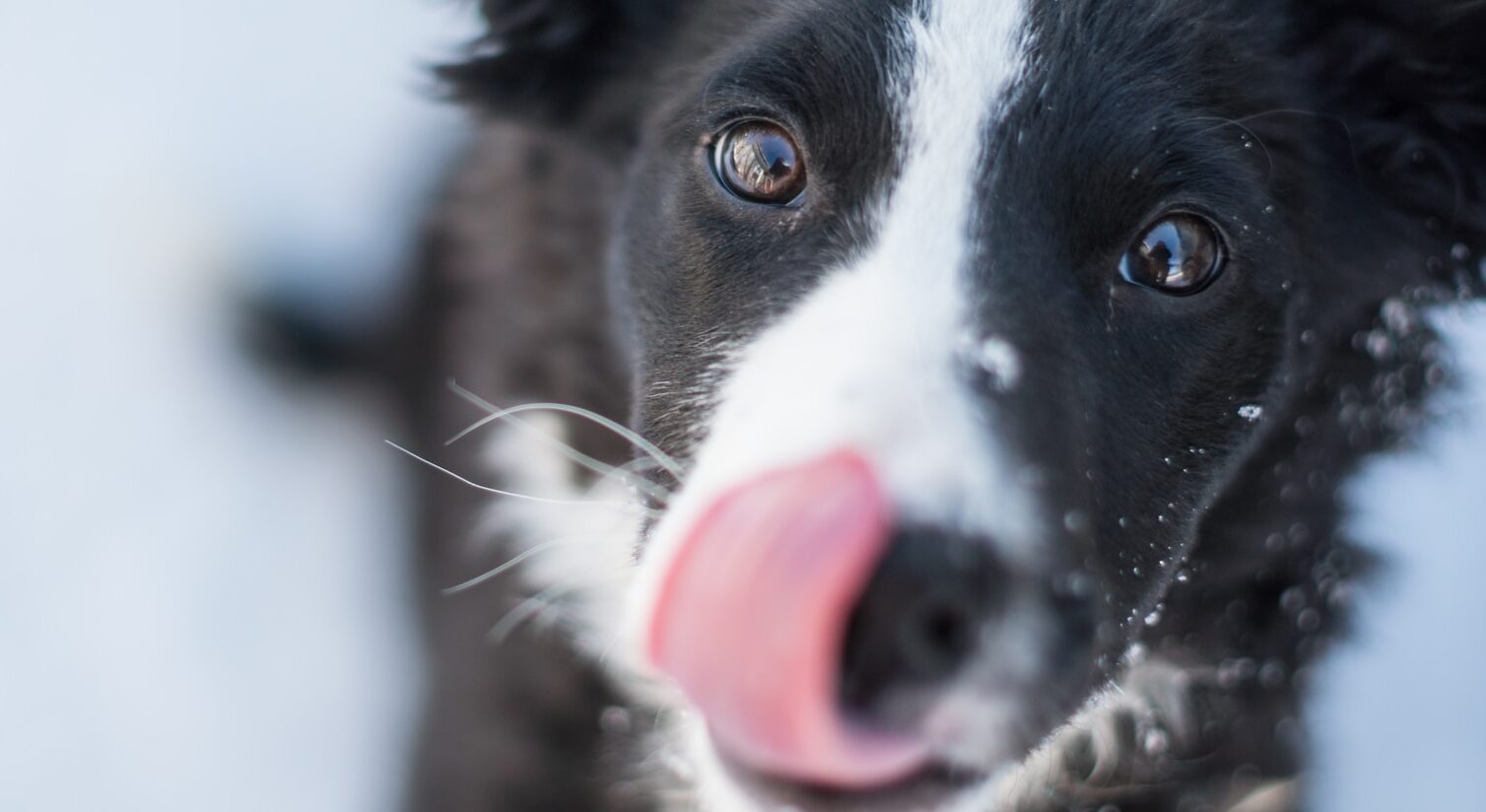
Key points
- Excessive lip licking can be caused by a number of things, but it most often occurs as a response to stress, dehydration, nausea, and allergies. Your dog may also lick its lips when it feels oral discomfort, internal pain, or bloat.
- Sometimes, lip licking can be a sign of neurological problems such as epilepsy. In this case, licking occurs as a symptom of a seizure.
- Dogs can also lick their lips in an attempt to get your attention. In this situation, you need to determine what action of yours your dog perceives as a reward.
- If you see your dog licking its lips and sneezing, it means that the pet is experiencing an allergic reaction to something. The most common allergens for dogs include dust, pollen, grass/weeds, and mold.
- If your dog is licking and yawning simultaneously, it can be a sign of either anxiety or nausea. You should find out the cause as soon as possible to prevent it from adversely impacting your dog’s well-being.
Seeing your dog constantly licking its lips may concern you and leave you clueless about the cause of this behavior. Your dog may also look uncomfortable, lick the floor or carpet, and swallow air. At the same time, the pet’s teeth, gums, and nose may look fine, and nothing will seem unusual except for the pet’s behavior.
There are many reasons why your pet may repeatedly lick its lips, and some of them include serious health conditions. So should you be concerned? What’s causing this abnormal behavior in dogs? How can we stop it? Keep on reading and learn ways to tackle this issue.
Table of Contents
Normal Behavior
It’s natural for canines to lick their lips to express a range of emotions or just use the behavior as a communication tool. It’s a way to show their affection and love to their owners. However, lip licking may also be a sign of confusion. Even during inter-dog conflicts, dogs can lick their lips to show that they are not interested in the quarrel. Licking is also a normal physiological reaction to food or treats. But can you know when you should start getting concerned about your dog’s excessive lip licking?
Why Do Dogs Start To Lick Their Lips Excessively?
Excessive lip licking may occur as a self-defense mechanism as a result of internal discomfort. For example, the pet may exhibit this behavior if it feels threatened, anxious, or nervous. Dogs also tend to lick their lips when they suffer from nausea, allergies, or internal pain,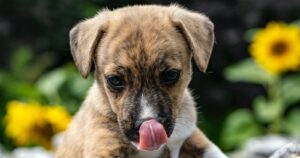 which are often associated with heart conditions.
which are often associated with heart conditions.
While the most common reasons why dogs start licking their lips excessively are allergies, nausea, and dehydration, lip licking can also occur due to certain medical conditions or learned behaviors. Sometimes, lip licking is a result of an inflammation of the esophagus (esophagitis). This condition results from acid reflux or oral diseases.
If you see your dog licking its lips in uncomfortable situations such as vet visits, it means that this behavior is probably a stress response. However, it can become an obsessive habit, or in other words, a “stress calming signal” similar to nail-biting or finger cracking in humans.
Top Causes For Lip Licking In Dogs
Nausea
Frequent lip licking and swallowing may indicate that your pet is experiencing nausea, as when a pet is nauseous, the function of its salivary glands increases, and your canine may lick its lips to get rid of the excess saliva. If you see your dog eating grass, don’t try to stop it, as it’s a natural way for canines to induce vomiting.
Licking and gasping can be a result of your dog eating something toxic or indigestible. If there’s a chance that your dog may have eaten something toxic before starting to exhibit this behavior, take it to the vet immediately. If this behavior is caused by food intolerance, you can try different remedies for an upset stomach. But if the vomiting persists for more than 24 hours, you should seek veterinary attention because it’s likely a sign of poisoning or another medical condition.
Discomfort
If your dog licks or bites its lips, it may be a sign that the pet is experiencing oral discomfort. In this case, you should check the pet for tooth decay, foreign objects stuck in the mouth, periodontal disease, or swollen salivary glands.
To check the salivary glands, look for swelling under your canine’s jawline or tongue because that’s where its salivary glands are located. If you notice swelling in these areas, it indicates that sialocele (fluid found in cystic spaces) has accumulated in the surrounding tissues.
If you suspect that your pet may be suffering from oral issues, take it to the vet for an examination. While you can visually examine the pet’s tongue and gums yourself, you won’t be able to see all the way to the larynx, which is why veterinary help is needed. In addition, your vet may need to sedate your dog to look over its soft palate.
Dehydration
The most common reason for dogs smacking their lips is dehydration. Hot weather or prolonged physical activity can cause the pet to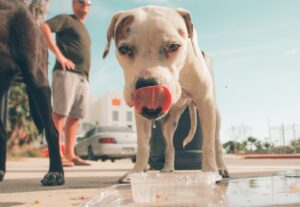 experience a heat stroke and become dehydrated. Sometimes, dehydration is a symptom of a medical condition such as kidney or liver disease.
experience a heat stroke and become dehydrated. Sometimes, dehydration is a symptom of a medical condition such as kidney or liver disease.
Signs that your dog is experiencing dehydration include pale and sticky gums, loss of skin elasticity, and hollowed eyes. To test if your pet is really dehydrated, you can pinch your dog’s skin and lift it as high as you can. The skin should snap back into place quickly after you release it. If it doesn’t, it means that your dog is dehydrated, and you need to give your pet a lot of water. If, however, your dog experiences lethargy, vomiting, or diarrhea, a vet visit is necessary.
Stress Response
As mentioned above, dogs can lick their mouth as a way to appease themselves. This behavior means that your doggy is stressed or anxious and wants to avoid the trigger. Take a look at the surrounding factors and try to determine when exactly your dog licks its lips. If this occurs during every vet visit or every time you travel, it may be a stress response.
And what if your pet starts licking its lips every time you come home? This may indicate that you’ve scolded your dog shortly after coming home several times in the past. Since your pet can’t associate scolding with past actions, it will be stressed and alert every time you come home.
Pain
When dogs are in pain, they typically bark or whine, but they can also constantly lick their lips. The common conditions that cause internal pain are kidney or liver diseases and conditions that cause dehydration. Don’t try to diagnose your pet yourself and take it to a vet for an examination.
Partial Seizure
In some situations, your dog may develop focal seizures. For example, you may notice that your pet sometimes licks the air around it or catches imaginary flies but, at the same time, seems normal and responsive. This is a sign of epilepsy, and you should book an appointment with your vet so they can diagnose the pet and prescribe medication to control the seizures.
Swallowing A Foxtail
Foxtails are plant seeds that tend to cling to the fur between the dog’s toes and inside the ears, throat, nose, and even eyes. If a foxtail becomes lodged in your dog’s throat, the pet will most likely panic, cough, gag, and swallow continuously. You may also see your pup eating grass or compulsively licking the floor, walls, or people.
If you suspect that your pet may have been in contact with a foxtail, you should immediately take your pup to a vet since foxtails can be dangerous for dogs. If a foxtail is lodged deep inside the throat, there’s a risk of infection, and the pet may need surgery.
It’s easier to deal with the issue if it’s determined at an early stage. Your vet will use tweezers or forceps to remove the seeds. Your dog may need anesthesia or sedation, depending on where the seed is located.
Licking A Toxic Toad
A dog can also develop compulsive licking if it licks a toxic toad. The most common types of deadly toads are the Sonoran Desert (Colorado River) toad and the Marine or Cane toad. Symptoms of toad toxicity appear within few minutes and include:
- Severe drooling
- High body temperature (hyperthermia)
- Unusually red gums
- Vomiting
- Pawing
- Head shaking
- Foaming at the mouth
- Loss of coordination
If you observe any of these symptoms, thoroughly wash your dog’s mouth and immediately take it to a vet.
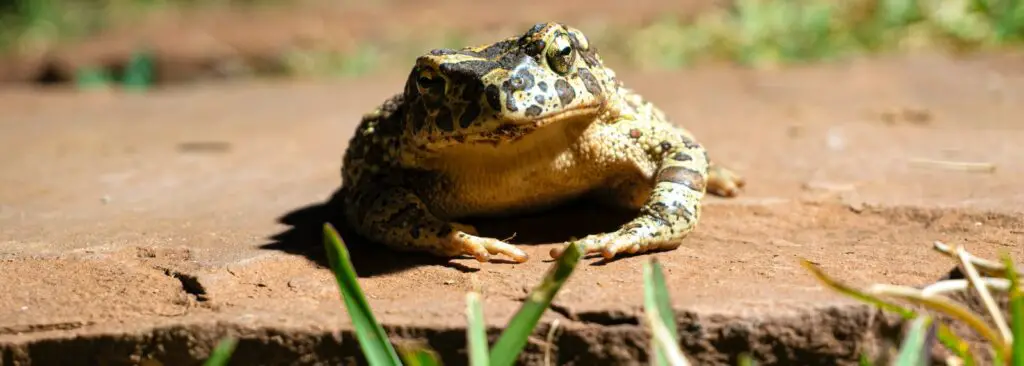
Bloated Stomach
Surprisingly, a bloated stomach can also make your dog lick its mouth non-stop. A canine stomach can become enlarged due to the food, fluid, or gas. Deep-chested dog breeds are more likely to experience this phenomenon. You should seek immediate veterinary attention if your dog starts to pace nervously and retch because bloating may pose a danger to canines and even be lethal.
Attention Seeking
As with any destructive behavior, lip licking can be an attention-seeking act. If there’s no other underlying issue causing this behavior, you should look for answers in your own actions. For example, do you pet or talk to your dog every time it licks its mouth? If you catch yourself doing it, you should stop this behavior immediately because your dog will keep licking its lips to get your attention.
Licking And Sneezing
What if my dog is licking and sneezing at the same time? If lip licking is accompanied by sneezing, this is a clear sign of allergies or a reaction to an irritant. Besides foxtails, the most common canine allergens are dust, pollen, grass/weeds, mold, laundry detergents, cleaning chemicals, deicing salt, or flea medications.
Licking And Yawning
When your dog licks its lips and yawns, it indicates either stress or nausea. If your dog is nauseous, it’ll constantly lick, swallow, and yawn. Anxious dogs just lick their mouth and yawn. The sooner you determine the cause of nausea or stress, the easier it will be to stop this behavior.
Licking The Air
If your dog constantly licks the air around it but doesn’t display any other symptoms, it means that it’s a compulsive behavior that results from stress and anxiety. You should address this issue with the help of a dog specialist that will help to find the cause of this behavior and work with your dog to eliminate it.
FAQ
What do I do if my dog keeps licking his lips?
Usually, lip licking is a natural way for a dog to show affection, but it could also mean that your dog is stressed. If you notice your pet licking its lips, you can play with your pet to calm it down and give it a treat. But be aware that sometimes excessive lip licking is caused by medical conditions such as nausea, oral discomfort, pain, or even epilepsy.
Why does my dog keep gulping and licking?
If excessive licking persists for more than 24 hours, you should call a vet. Gulping and licking can indicate oral discomfort that affects the tongue, gums, or teeth.
Why does my dog keep flicking his tongue in and out?
This behavior usually means that your dog is uncomfortable in a particular situation or that it’s responding to somebody else’s discomfort.
What causes dogs to lick excessively?
The most common causes of continuous lip licking are anxiety, boredom, nausea, dehydration, and pain.




